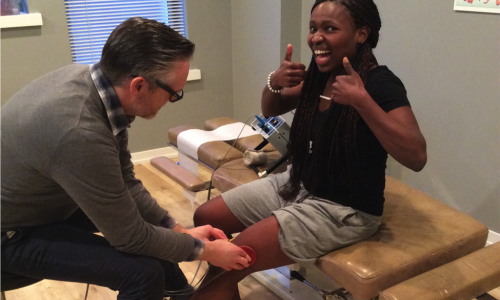
My Co-op career began early in my first year when I applied for the program and completed the required workshops. But at the time I had no intention of strategically choosing specific organizations or types of organizations, deciding how I should time my Co-op placements, or assigning any other kind of criteria for guiding my Co-op journey. I was still unaware of and inexperienced with the professional world. Keeping my expectations modest, I only wanted something that would pass the standard of providing more applicable and meaningful work related to my intended Political Science major than my previous retail experience. I was open to any experience that would accomplish this goal, and was itching for real-world experience outside the lecture hall and tutorial rooms.
I am now fortunate enough to be on my way towards successfully completing the requirements for a Co-op degree - involving the completion of four Co-op terms spread out over two fantastic and diverse placements, each eight months in duration. In retrospect, I see the remarkable benefit that a diversified Co-op journey allows through factors such as exposure to different types of organizations, timing of placements, and job related responsibilities. While these placements were landed largely coincidentally, I would encourage both those currently in and those thinking about the Co-op program to plan a diversified Co-op experience, because looking back, I see the benefit of this approach. I want to highlight some of the key general takeaways from my two Co-op placements by juxtaposing them in the context of these factors. I’m not favouring one Co-op placement or experience over the other, but rather taking under consideration the benefits of having a set of (flexible) criteria in mind for planning and choosing placements in order to get the most out of the Co-op experience.
First, context. My first Co-op placement was with Aboriginal Affairs and Northern Development Canada (“AANDC”) as a Junior Analyst in the Treaties and Aboriginal Government (TAG) sector, and it was initially a four-month placement, but was extended to eight-months. My last placement was with an information management firm in the US health care sector as a Research Assistant, and it was an eight-month contract.
Based on these experiences, I feel that the main areas to consider when diversifying a Co-op portfolio could include the following:
Private Sector vs. Public Sector
There is a huge difference between the workplace culture of a private business versus the public sector. For example, an exciting regard for public purpose is generated when working for government. When working for a private firm, there is a greater focus on meeting the goals of the business with efficiency (and, oftentimes, free company lunch outings to reward meeting this demand!). Since the private firm I was working with is considered to be an entrepreneurial start-up, there was an exciting sense that the firm was growing as opposed to the reality of job stagnation faced by many government departments. Having exposure to both of these sectors serves as a great competitive advantage. It also functions as a self-discovery tool to uncover the kind of workplace values specific to either the private or public sector one favours, and the kind of culture that gives the greatest intrinsic incentive to want to move up and succeed in a career.
Timing of the Co-op Placement
I completed my first co-op placement with AANDC at the end of my second year. This is a lot earlier than most would, but it was the right time for me to start developing myself at a professional level. Having a Co-op placement at this stage with practical experience in my area of Political Science reconfirmed my interest in pursuing the discipline as my major. My last Co-op placement was completed during the middle of my fourth year, at a time closer to graduation. Having a placement closer to graduation was helpful as I was building off of the experience gained from my first Co-op, as well as a greater proportion of what I had learned during my undergraduate studies. I would therefore recommend getting started with Co-op as soon as possible, and diversifying the timing of Co-op placements, such that one placement is closer to the middle, and another one closer to the end, of an undergraduate degree.
Size of the Organization
My last placement was with a small firm, with only about 20 people spread out over two main offices covering the three major areas the company is involved in: research, IT, and sales. Conversely, AANDC is a large organization with a wide mandate and thousands of public servants in its vast bureaucracy. As you can imagine, communication strategies are significantly different between these two environments, and have to be adjusted accordingly. With a large organization, I was consistently interacting with new people as each new project or issue would have a delegated expert somewhere in the bureaucracy, and this sometimes required a greater regard for professional conduct.
Mandate of the Organization and Associated Responsibilities
My AANDC experience allowed me to immerse myself in a whole host of interesting matters regarding the establishment of treaties. This meant I gained experience in First Nations public policy issues, property management, and program development. My last Co-op placement introduced me to the American health care sector. This meant I gained experience in database and information management systems, synthesizing complex policy documents, and, since it is a small firm, I was able to directly participate in the human resource aspects of the firm, including recruitment and training activities. All of these areas of responsibility were valuable, and the overall experience of each placement complementary. When selecting a career, I will be keeping the accomplishments and challenges of these placements in mind. Choosing placements that each offer a different set of responsibilities will allow you to gain the most of the Co-op experience.
Relation to Coursework and Extracurricular Activities
When I started my public sector placement with AANDC (which is a federal government department), I had just completed a couple of Political Science courses on Canadian government and Canadian public administration in the preceding semester. When I started working for the federal government, I kept a lot of the terms, theories, and perspectives from these courses in mind, as they were greatly applicable.
When I started working at my last Co-op placement with a private firm, I had begun volunteering with Enactus SFU (a student-run social entrepreneurship non-profit organization with programs that target social, economic and environmental needs in the community). I started as a Consultant with their Axis Consulting program in the semester preceding my last Co-op placement, and later transitioned during my last placement to become Director of Program Development on the executive team of the organization. My Enactus involvement inspired an interest in entrepreneurship and the fundamentals of running and improving organizations with business principles in mind. Working for a growing firm allowed me to get a sense of what being a part of one is like while gaining a greater respect for both the time and intellectual effort that goes behind making a successful business from merely an idea. Planning your Co-op placements around coursework and other volunteer activities may be a beneficial approach, perhaps by focusing on obtaining one placement that relates to your course of study, and another one that complements your studies or relates to an extracurricular activity.
Additionally, during my Co-op placement with AANDC, I kept extracurricular activities to a non-existent minimum. With my last placement, I was actively involved with Enactus SFU, and invested considerable time in the evenings and on weekends with the organization. The takeaway here is that I was able to determine how much additional work I can comfortably and enjoyably handle outside of full-time employment. Depending on your interests, experimenting with different quantities and types of extracurricular activities while on Co-op may be useful. Diversifying your Co-op approach will allow you to include both of these situations and compare what you can comfortably handle.
Diversification vs. Depth
I find that four-month placements are not long enough to truly make the most of a Co-op placement. Both of my Co-op placements have been eight-months in duration. While you are learning throughout an entire Co-op placement, the first four months is when you are still learning the basics of your job and the organization. During a second term with the same organization, you have a greater opportunity to make more of a contribution and impact to the organization, since the basic fundamentals by this point have been mastered. I think having a couple of eight-month Co-op placements (as opposed to a bunch of four-month placements) allows for the desirable diversification idea, but also the depth gained by working with an organization for a longer period of time. Having multiple placements will also expand your professional network more than completing one placement. A balanced approach like this allows for making the most of the Co-op experience.
One of the goals of completing the Co-op program is to get a sense of what type of organization you want to work for in the future as a career. By being open to pursuing and comparing experiences in different types of sectors or organizations, this objective can be more accurately achieved. I am thankful for my Co-op experience that SFU and the two organizations that I’ve worked for have provided. Co-op has so far been the highlight of my undergraduate degree, as I’ve gained a diverse array of useful practical experience in the professional world.
Beyond the Blog
- Visit the FASS Co-op Page to learn more about opportunities like Mark's!














